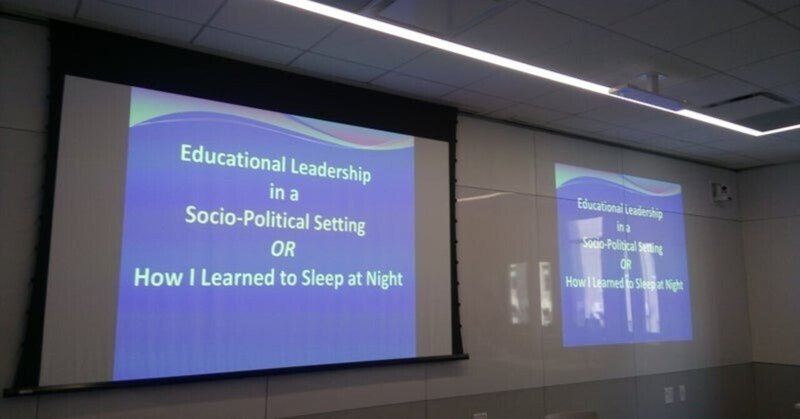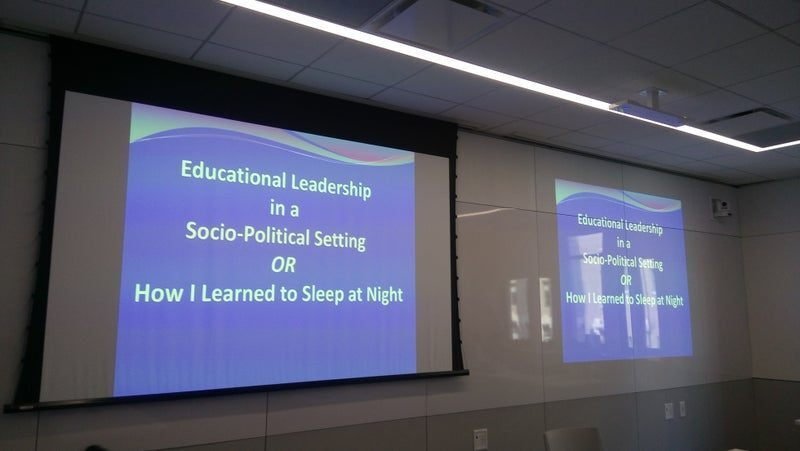
Spring 2018 Course5: Leadership in Schools & Community -リーダーシップ理論を自身に適用する-
Now I'm wraping up my study and stay in NYC, for I'm going in leave here in two weeks... anyway, today's post is about the Spring course, Leadership in Schools & Communities!
さて、実は帰国まで2週間を切りいよいよバタバタし始めてきました…が、授業紹介が後2つあるので更新していきます!
今回はLeadership in Schools & Communitiesの授業。
(以前のEducation Pioneerのリーダーシッププログラム)
1. どんな授業? ~教育長経験もある教授に学ぶ~
こちらも例によってTeachers Collegeの授業で、教授はProf. Jeffrey Young。彼はハーバードやMITなんかがあるMAのCambridgeで教育長をした経験もあり、英語教員でもあった実務家です。
この授業のフォーカスはタイトルにもあるとおり、学校や地域でのリーダーシップをどのように捉えるかという観点からディスカッション中心の授業です(座席の配置も教授を囲んでU型になっています)。
This is also a Teachers College course, and taught by Prof. Jeffrey Young. He served as the Superintendent of Cambridge Public Schools, where Harvard and MIT are located. He also has been an English teacher, so with a lot of experience as a practitioner!
This class focuses on the various aspects of leadership in schools and communities, mainly through whole-class and small-group discussions (interestingly, the configuration of seats looks like a U-shape).

2. どんなことを学ぶの? ~これまでの「リーダー」概念とは正反対~
さてどんな内容かということでシラバスを見てみましょう。 As for details, let's take a look at the syllabus.
・Class 1: Introduction
・Class 2: Understanding the Public, Part 1 - What motivates citizens to act - self, interest, the public good, or both?
・Class 3: Understanding the Public, Part 2 - What is the role of government in democratic society?
・Class 4: Understanding the Public, Part 3 - What are the possibilities and limits of public deliberation in modern America?
・Class 5: Leadership and Management, Part 1 - What is the nature of the leader-constituent interaction?
・Class 6: Leadership and Management, Part 2 - Under what conditions and circumstances can leaders overcome obstacles to make a difference?
・Class 7: Leadership and Social Justice - How do our values, assumptions and behaviors influence our ability to serve ALL students or constituents?
・Class 8: Leading Change, Part 1 - How can leaders help people rise above self-interest and nurture a culture of collaboration?
・Class 9: Collaboration in Communities - Under what conditions can collaborative practice flourish, and what does it look like in action?
・Class 10: Leading Change, Part 2 - How might individuals expand their personal capacity to exercise leadership?
・Class 11: Exercising Leadership, Part 1 - What makes exercising leadership dangerous?
・Class 12: Exercising Leadership, Part 2 - What are the challenges and opportunities leaders face every day?
・Class 13: Exercising Leadership, Part 3 - How can we step back, see the bigger picture, manage a community's problem-solving, and survive?
・Class 14: Exercising Leadership, Part 4 - How do leaders keep their eye on the prize and still find ways to improvise?
・Class 15: Conclusion
リーディングとしてはリーダーシップに関する様々な文献、あるいは著名人のスピーチ等を分析しながら、そこに隠されているのはどんな要素か?ということをひたすら議論します。
リーダーというと「カリスマ的」「一定の方向性の下に皆を導く」といった言葉を連想される方もいるかと思いますが、それのむしろ反対をいくのがこの授業になります!
Course readings include articles on leadership and speeches by internationally recognized leaders, through which we analyze crucial elements of leadership. Although some might associate leadership with such dimensions as charismatic, or giving directions, but this course is exactly the opposite of these concepts.
3. リーダーシップの要素とは? ~VulnerabilityからSustainabilityまで~
まず面白いなと思ったのは、以前Akikoさんへのインタビューでも出てきたVulnerabilityがリーダーシップの要素として挙げられていることです。
これは自分のありのままの姿を曝け出すということなのですが、それによってHolding Environmentと呼ばれる安心して言いたいことを言える環境を形成できるというわけです。
また、文献には直接この言葉は出てこないのですがSustainabilityもリーダーシップの非常に重要な要素だと私は考えています。
すなわち、ある偉大なリーダーがいてその在任中には目覚ましい功績をあげるのですが、その人が退いた後にその組織が停滞してしまうことが多々あります。
これを私は非常に問題だと捉えていて、どのように変化が特定のリーダーに依存せず継続するようリーダーシップをInstitutionalize(制度化=組織の文化として定着させる)かがカギだと思っています。
What was intriguing to me was that vulnerability, which Akiko touched upon in one of the previous posts, is regarded as the important element of leadership. Vulnerability means opening up yourself (or exposing), by which you can create a Holding Environment where people can express their opinions with honesty and comfort. Moreover, although not explicitly states in the literature that I read, I think of sustainability as indispensable to leadership. That is, in too many cases there was a great leader who achieved remarkable reforms, but the organization that he or she belonged to quickly became dysfunctional after his or her departure. Therefore, institutionalizing leadership is essential for changes to endure without relying solely upon a particular leader.
4. 評価は? ~過去のリーダーシップ経験の振り返りも~
授業の評価ですが、学期中に5回あるReflection Paper(2~3週分のリーディングを自分の過去の経験等に当てはめて分析するもの)のほか、Case PaperとFinal Paperがあります。
前者は自分の過去のリーダーシップの経験を1つ選び、リーディングに出てきたリーダーシップの要素を適用しながらそれを振り返るというものです。
Final Paperは「効果的なリーダーシップとは何か?」という問いに対するThesis Statementを提示し、文献や体験談でそれをバックアップするというものです。
どちらもただリーディングを読むだけではなく、それを自分の考えに当てはめることを常に考えさせる課題で、非常に良い学びとなりました。
With respect to grading, in addition to five short reflection papers (in which we apply course readings of two to three weeks to our own experiences), we have a Case Paper and Final Paper. The former asks us to reflect on our past experiences of exercising leadership using a variety of course readings. The latter centers on this question: "What is your theory of effective leadership?" We are supposed to write a thesis statement, and back it up with class readings and our own experiences. Both of them gave me valuable opportunities to think beyond what each literature says and reframe it through my own lenses.
では今日はこのあたりで。時間は最後の科目、Independent Studyについて紹介しますので、是非読んでくださーい!
Let's call a day - next time I'll introduce my last course, Independent Study! Please look forward!!
(※本ポストは、2018年5月時点のものをリメイクしたものです。)
この記事が気に入ったらサポートをしてみませんか?
